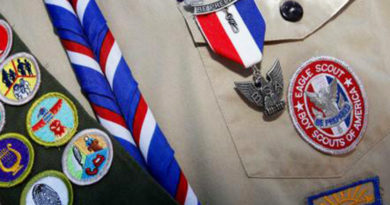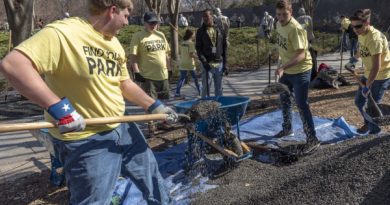‘We’ve Got to Get Out of Here’
[subhead]Quick thinking saves Boy Scout, dad during flood[/subhead]
It seemed an innocent enough mistake, when Grant Glaesmann left his pocketknife in his backpack, instead of bringing it into the tent he shared with his father.
The 16-year-old Preston Hollow resident realized that after he settled into his sleeping bag on the second night of a 12-day trek through Philmont Scout Ranch this summer in New Mexico.
A few hours later, a little after 3 a.m. to be exact, raging flood waters uprooted and nearly submerged the tent, prompting some potentially live-saving resourcefulness on the part of the teenager.
The father and son couldn’t find the zipper, and they needed a way out as they were carried helplessly away from their campsite. So without a cutting tool, Glaesmann turned to desperate measures.

“I just went to the next best thing, which was my teeth,” he said. “I guess it was adrenaline. I’ve never heard of anyone biting through a tent. I just bit a hole and ripped it open.”
Fortunately, that was also the one night that he forgot to put in his retainer before he went to bed. Otherwise, there’s no way his unusually sturdy choppers could have saved the day.
“We hopped right out of there, and the tent immediately got swept away by the water,” said Grant’s father, Brad Glaesmann. “Once it went sideways, it flopped down and it went.”
Surviving the storm
Inclement weather is nothing new at Philmont, but the storm that hit that night was possibly the worst in the 77-year history of the 140,000 acre ranch about 50 miles south of the Colorado state line.
The 12-person group included six Boy Scouts, five parents, and a 19-year-old ranger leading her first crew into the back country. Their trek was scheduled to cover 71 miles, with a new campsite each day.
“When you come into a camp, the boys could pick where we’re going to be,” Brad said. “You just kind of pick what looks appealing.”
On the second night, the two-person tents were spread out by several hundred yards as a precautionary measure against bear attacks. So the Glaesmanns were pretty much by themselves.
They were experienced campers, but most of their previous excursions had only been for a night or a weekend. Their campsite that night was tucked into a valley amid the mountainous terrain, elevated slightly between a service road and a creek. Earlier that day, they talked as a group about flash flood safety.
“We were on high ground,” Brad said. “We felt pretty good about it.”
Due to a recent wildfire, there was abundant tree sap that generally prevented the water from soaking into the ground. Still, the weather in the area was volatile, as is common during the summer months.
“All night, there had been this storm,” Grant said. “The lighting was constant.”
Rather than the thunderstorm moving from the mountains to the plains, however, this one stuck around. After a lull in the rain, it started up again, worse than before.
“After it was coming down the second time, the sides of the tent on the bottom started getting wet. I had never seen that happen,” Grant said. “Tents are supposed to be pretty waterproof.”
Brad wasn’t concerned at first. He tried to fall asleep, while Grant — a self-proclaimed “rule minder” — urged the duo take precautions.
“The lightning was on top of us,” Grant said. “I was afraid it would zap near us. I was kind of keeping us up.”
Then a blast of water hit the tent, almost like a tidal wave. They could hear boulders rumbling. And Brad admits he started to freak out.
“Suddenly, the inside of the tent was filled with cold, muddy, brown water, and our tent started to roll,” Brad said. “Our weight was kind of holding it, but we were moving around so much.”
The tent collapsed, leaving the father and son scrambling for a way out as it began to wash into a nearby creek bed.
“We were looking for the zipper on the tent,” Brad said. “My exact words were, ‘Grant, we’ve got to get out of here or we’re going to die.’”
Getting their bearings
Once they escaped the tent, their harrowing adventure was far from over. It was still raining, and the water was still rising around them. Fortunately, they were able to cling to some giant rock chairs that some scouts built adjacent to the site decades ago, but had never come in as handy as that night.
“When we were moving downstream, that was the first thing my light hit,” Brad said. “We jumped on them.”
However, they were still wet and cold, and it was dark. Brad lost his glasses, and Grant was shivering in his underwear and a T-shirt. Neither of them had any shoes.
“There happened to be one backpack that didn’t get swept away,” Grant said. “I found whoever’s clothes they were, and I put them on. There was a tarp on it. We huddled under that. Even though it was wet, it was the warmest thing we had.”
Grant threw Brad a long-sleeve T-shirt and a hat as they held on to one another for warmth. The rocks helped to create a dam of sorts around their immediate vicinity.
“No one else is out at this time. No other tents are gone yet. Only ours had gotten swept away,” Grant said. “The one mom on the trip walked out of her tent, wondering what happened, because I guess we were screaming and trying to get people out.”
By that time, some of the troop’s other tents were likewise being whisked away by the water, although not to the same extent. When the rain stopped, two tents on higher ground were still upright. Eight of them huddled together in a two-person tent until the sun came up.
“We were all holding hands and praying,” Brad said. “Fortunately, we didn’t have anybody injured.”
Assessing the aftermath
The Glaesmanns never found their tent. It likely was buried under a few inches of mud and silt that changed the terrain of the campsite. One of the other parents found Grant’s pack, which was ripped and only contained a pair of underwear, two left shoes, and a deck of cards.
The group still had its food, which was hanging in a tree during the storm to keep it away from bears. But most of their gear was lost, and morale was low. Later that morning, staff members arrived to drive them back to base camp.
“We looked a sight,” Brad said. “We were walking through base camp and people were looking at us like we were homeless.”
They later found out the storm dropped 2.5 inches of rain in 30 minutes at its peak. It relocated several structures at the ranch, and destroyed a bridge that had been there for almost a century. More than 20 other treks were affected.
The flood also killed a scout from California whose tent was washed away under similar circumstances not too far from where the Glaesmanns were located.
“In the history of Philmont, this was epic,” Brad said. “This was torrential rain. They just don’t have weather patterns like this typically in that arid climate.”
Perhaps unbelievably, all but two members of their group elected to continue the trek for the remaining days with a shorter itinerary.
So the remaining campers spent two nights at base camp, with showers and hot meals under their belts, and were outfitted with new clothes, tents, and gear. A scout from another troop gave Brad some disposable contact lenses. Then they headed back into the wilderness.
“This was what I came here for,” said Grant, a sophomore at Bishop Lynch. “I figured it really can’t get worse.”
They ran into another overnight downpour during the ensuing week or so, but this time, they had learned their lessons.
“Always have a knife in your tent when you go to bed,” Brad said, “and always camp on high ground.”






